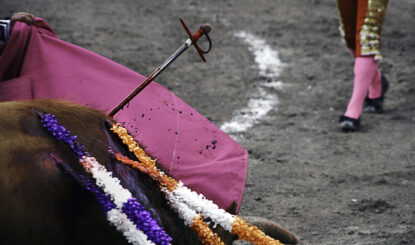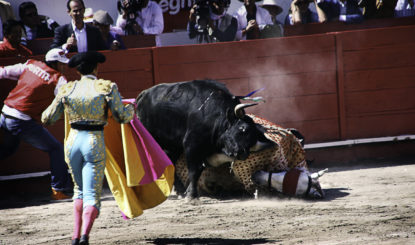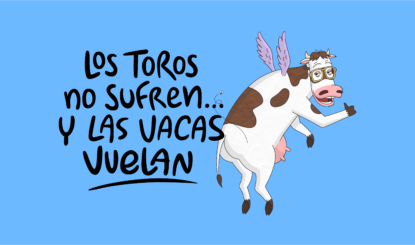Spain: The UN Aims to Protect Minors from the Violence of Bullfighting
Children and adolescents should no longer be permitted to attend bullfights in Spain. This is the recommendation of the UN Committee on the Rights of the Child. This call from the highest international body for upholding the rights of minors is based on a report by Fondation Franz Weber.
The recommendation from the UN Committee on the Rights of the Child has now reached the heartland of bullfighting: Spain. Seven of the eight countries in which the corrida is still legal have now been called on by the UN to protect minors from the „damaging effects of bullfighting“ and to ban their participation in such events, as both bullfighters and spectators. The Committee on the Rights of the Child, whose task it is to inspect whether the United Nations’ Convention on the Rights of the Child is being adhered to, has always based its recommendations on reports by Fondation Franz Weber (FFW), written as part of its campaign „Childhood without Violence“.
Today, the Committee has clearly condemned Spain’s failure to ban children and adolescents from participating in bullfighting events, whether actively or passively. Among other things, the Convention on the Rights of the Child upholds the right of all minors to physical and mental integrity. It also encompasses the duty of the state to guarantee the protection of said rights. In the bullfighting world, Spain is in clear breach of this duty. FFW proves this in its scientifically based report, since children who take part in bullfights, whether passively or actively, are – without doubt – exposed to extreme violence.
In addition to the submitted report, on which the UN’s recommendation to Spain is based, in June 2017 Fondation Franz Weber took part in the preparatory meeting between the Committee on the Rights of the Child and non-government child protection organisations. The FFW report caused a particular stir with its finding that Spain not only exposes minors to extreme violence by permitting them to attend bullfights, but also that over 58 bullfighting schools exist in the Iberian country, which put the physical and mental integrity of children and young people at risk through the bullfighting training they deliver.
On 22 January 2018, Spain was repeatedly questioned on this topic at a public meeting of the UN committee in Geneva via a delegation from the Spanish government. „Bullfighting events expose children to extreme violence,“ was the unequivocal statement from Gehad Madi, a member of the Committee. Therefore, these events must be banned to all those under the age of 18. Not only to young toreros, Madi emphasised, but also to underage spectators: ‟The Committee’s task is to protect children from extreme violence. We hope that Spain will now ban minors from participating at bullfights.”
The reaction from the Spanish delegation did not appear to convince the Committee. Instead, the delegation limited itself to the excuse that it is the autonomous regions that decide the admission age to bullfighting schools, for example ‒ in some cases, accepting pupils at age 14. Ultimately, however, it is up to the national government to implement child protection practices. Therefore the Committee also recommends amending the law by banning the participation of minors at bullfighting events throughout Spain. „Upholding the wellbeing of the child, the Convention’s main task, in this case clearly outweighs the right to access culture,“ added Ana Mulá, FFW’s lawyer.
By making its statement to Spain that bullfighting events violate children’s rights, the UN has affirmed its clear position. This puts all eight countries in which bullfighting is still legal under additional pressure. In order to guarantee the rights of its children, they are now being called on to amend their laws, at long last, in order to protect minors from the violence of bullfighting. „The UN has given another clear sign against this barbaric, anachronistic form of animal torture,“ says Vera Weber, President of Fondation Franz Weber. „Because it is not only bulls and horses that are the victims of bullfighting, but children and young people too. And, ultimately, the whole of society as well.“
More information about the topic on our project pages:


